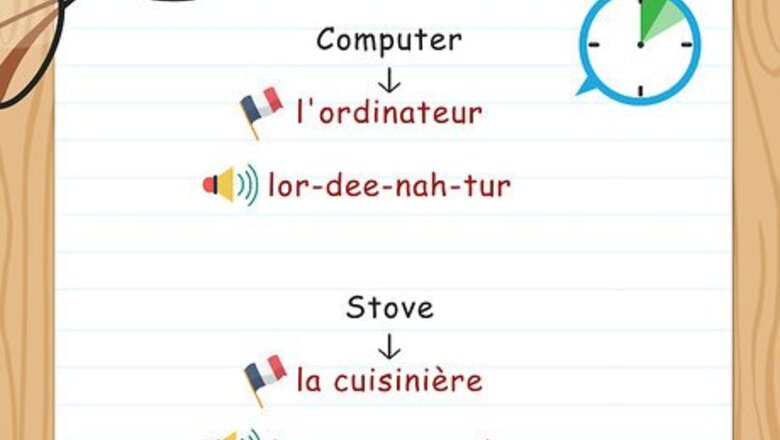
views
Practicing
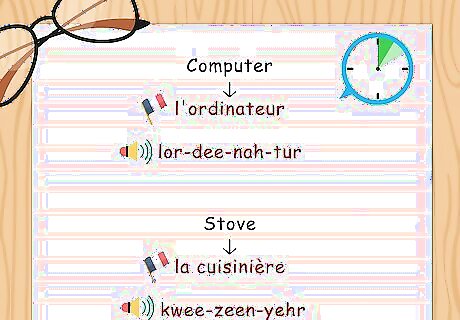
Study in frequent short bursts. Learning a foreign language well takes time - there's no way around it. Long, infrequent cram sessions just won't work. Instead, study or quiz yourself in short bursts of 5-10 minutes. Try to do several of these throughout the day. Once you build up a good knowledge of the language, you will retain more from longer sessions.

Trust flashcards. While they seem like the bane of any language student's existence, flashcards are actually a proven way to learn vocabulary. They're also cheap and easy to make. You can keep a stack of flashcards on you and quiz yourself whenever you have a few spare minutes throughout the day. Just focus on a few words at a time. You can use index cards for a traditional choice, or websites or apps to create virtual cards. The key to flashcards is repetition--use them often, and quiz yourself on old flashcards, too. Use the words as often as you can to help them stick.
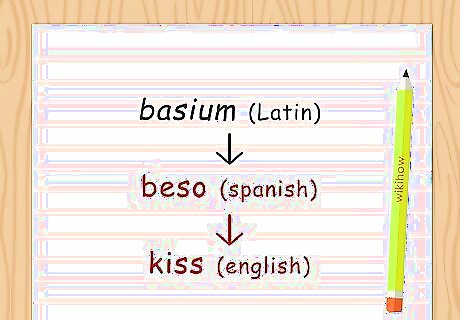
Work with new words, don't just look at them. Studies show that learners need to encounter words several times in different contexts before they really stick. To speed this process up, whenever you learn a new word, look at how it is used in context, and then follow a series of steps: Pronounce the word and spell it Study the meaning of the word (look it up if you don't know it) Create a sentence in your own words using the word Write the new word and its meaning several times
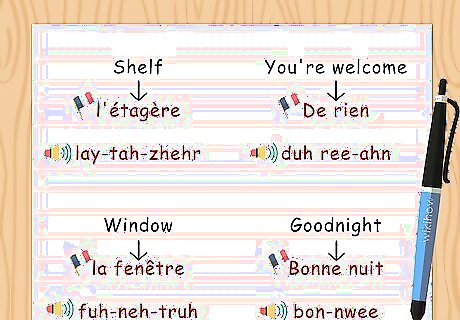
Read, write, and repeat phrases to cement them in your brain. The same holds true for learning a new phrase. Say it outloud, check their meaning if you aren't sure, and make up new sentences that use the phrase. To retain vocabulary, keep using these words and phrases, even after a test or after moving on to new topics.

Make friends with a conversation partner. Practicing your foreign language with native speaker or someone who knows it well supercharges your learning. Not only will you have the chance to put your knowledge into action and build confidence in speaking, you'll also learn new vocabulary from you partner. All while having fun! You can find a friend, tutor, or teacher who you can practice with. Check with a language instructor, look online for language groups in your area, or look for someone to practice with online via language learning sites. You can also try a tandem partnership with someone who is trying to learn your language. Spend part of the time practicing the language that is foreign to you, then switch to your own language and help your partner learn.
Remembering What You Learn
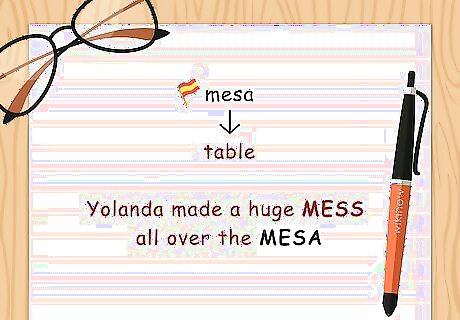
Get creative with some mnemonic devices. Making things interesting and funny greatly increases the amount of vocabulary you retain. Get in the habit of coming up with memory aids, or mnemonic devices, for new vocabulary. Have fun--the sillier, the better! For instance: You can develop some devices based on sound. If you're learning the word “mesa” (“table” in Spanish), say to yourself “Yolanda made a huge MESS all over the MESA.” You can create other devices based on meaning. For instance, if you're learning the word дом (dom or “home” in Russian), recognize that shares a root with the Latin word “domus” (“home”) and related English words. Think of a silly phrase like “Donald has a dozen DOMESTICATED dogs in his DOM.”
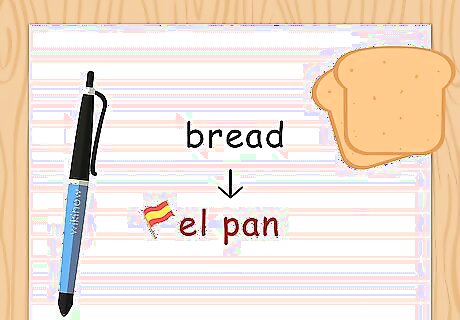
Visualize the meaning of words. Even if you can't get super creative with all of the words and phrases you learn, it still helps to simply create a visual picture of what you are learning. This can be as simple as imagining the thing you are studying. If you're learning “el pan” (“bread” in Spanish), picture a loaf sitting in a pan. If you're learning “ir” (“to go”), picture a fast car going down the street.

Try diglot weaving. While it sounds like a complicated term, diglot weaving is actually a simple and fun way to learn new words. Simply replace a word in a sentence in your native language with the corresponding word in the foreign language. Since you can lean on your native language while learning foreign words, it's great for beginners. Examples of diglot weaving include: ”My friends and I split a pizza at the lunch Tisch” (when learning the German word “Tisch,” or “table”). ”Romeo told Juliet he'd lover her siempre” (when learning the Spanish word “siempre, or “always”).
Finding Vocabulary
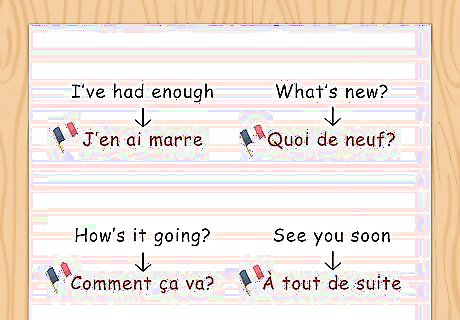
Learn vocabulary in phrases to maximize retention. Words aren't much good unless you know how to use them. Learning vocabulary in phrases rather than as isolated words is most helpful because it gives you context to help remember the meaning and gives you practicing using the vocabulary in natural ways. “J'en ai marre” (“I've had enough” in French) is an example of a phrase. Learning vocabulary in phrases helps you determine which words to use to “sound right” (called collocations). For instance, “I had a cup of powerful tea” and “I had a cup of strong tea” are both grammatically correct in English, but the latter sounds right because it is said more often.

Draw on multimedia sources to enrich your learning. Watching television, films, and other videos in foreign languages gives you chances to learn new vocabulary and to hear how it is used in authentic speech. If you are interested in the sources, you are more likely to pay attention and learn, so choose some that you love! Podcasts, YouTube videos, streaming films and programs, songs, and similar sources can all be great ways to learn. As you watch and listen, pay attention to any vocabulary you know, and write down new words and phrases you hear.

Read often to build context. You can pick up lots of vocabulary quickly from reading, especially if you read out loud. When learning a foreign language, make it a point to read at for at least a few minutes each day. Read whatever you find interesting. Studying a variety of texts is a surefire way to pick up vocabulary. Try reading the news, fiction, essays, comics, and even advertisements. When you encounter new words, try to guess their meaning first, based on the context. Then write them down and look them up later for practice and study.
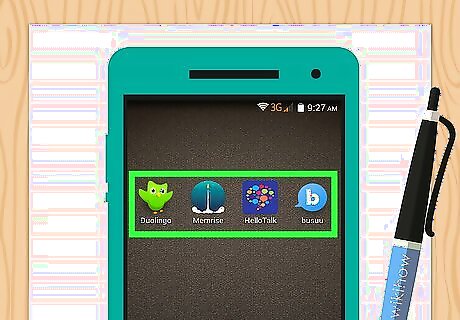
Try language learning apps. There are tons of possibilities out there, including Duolingo, Drops, and Memrise. While you can't really learn a language just from studying apps, they can be a great way to build vocabulary in a fun, interactive way. Most apps involve games (like matching words to pictures) and other tools that can make the learning experience engaging and help you retain words.
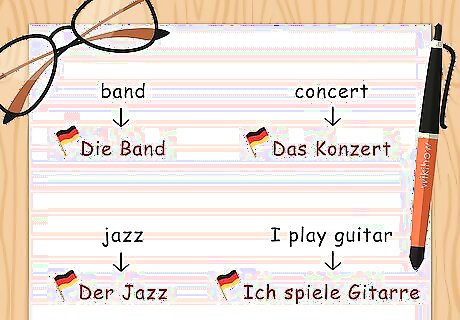
Group words into categories to pick them up faster. Groups of words together that relate to a common topic are easier to learn than lists of words that are all over the place. Textbooks usually present new words in this way, but if you're learning on your own, you can follow the same principle. For instance, if you are studying German and interested in music, you could study not only “die Musik” (“music”), but also words and phrases like: ”Die Band” (“band”) ”Der Jazz” (“jazz”) ”Das Konzert” (“concert”) ”Ich spiele Gitarre” (“I play guitar”) ”Mein Lieblingssänger ist Michael Jackson” (“My favorite singer is Michael Jackson”)
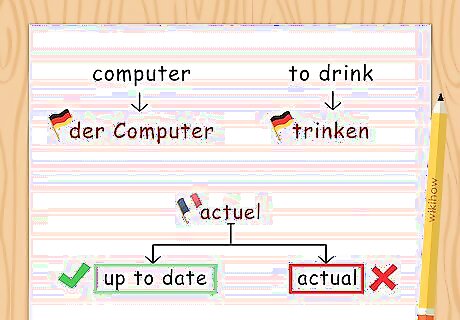
Focus on cognates to build confidence. If you're feeling overwhelmed by the amount of vocabulary you have to master to in order to understand and use a foreign language, look for cognates. These are words that look the same or nearly the same and have similar meanings in different languages. That means they're easy to remember. For example, “computer” in German is “der Computer.” Likewise, “to drink” is “trinken,” which looks very similar. Just watch out for “false friends,” or words that look the same but actually have different meanings. For instance, “actuel” in French does not mean “actual,” but “current” or “up to date.”
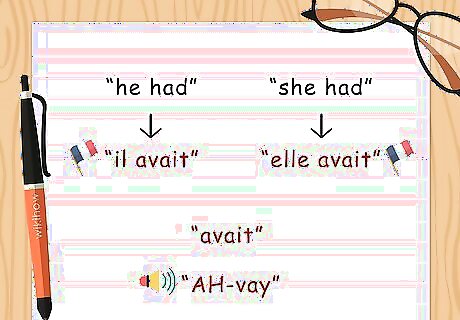
Make sure to learn the gender of nouns, if applicable. Many languages (like Spanish, German, and Russian) group nouns into different grammatical genders, which usually have no relation to biological gender. Learn the gender together with the noun's spelling and meaning so you'll know how to use it properly later on. For instance, “dog” in French is "le chien" and NOT “la chien.” Learn the vocabulary as “le chien” and not simply “chien.” Similarly, if you're learning verbs, make sure to study their correct conjugation.













Comments
0 comment